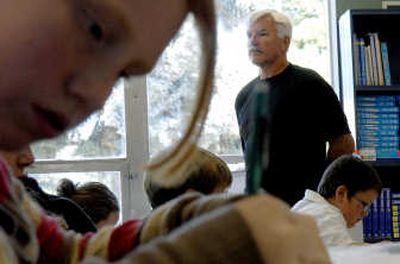Teacher raise plan tied to performance

BOISE – State Superintendent of Schools Tom Luna called Monday for big raises for Idaho’s teachers next year – but only if they come through a new pay-for-performance plan.
Luna unveiled a budget proposal that calls for putting nearly $60 million more into state teacher salaries next year – enough to give each teacher an average 8.5 percent raise in the state-funded portion of their salary. But if that money were just to go into the state’s current teacher salary structure, Luna said he wouldn’t back the funds.
“I do not support putting $50 million into the current salary grid that we have,” he told legislators gathered to discuss possible new ways of paying teachers. If the teacher pay system stays the same, Luna said, “It’ll be considerably less.”
Tying teacher pay to certain measures of performance, such as student test scores, is a controversial concept that has gained little traction in Idaho. But Monday, an array of groups ranging from the state teachers union to the state Board of Education spoke out for some type of new system to reward the best teachers for outstanding work, rather than just rewarding years of experience and additional college credits and degrees.
Luna said he’d like to see teachers get raises for acting as mentors for other teachers, gaining endorsements to teach in multiple subject areas, and helping students gain knowledge and achievement as shown on test scores. He said a new $2 million “longitudinal data system” would be key to making such a plan work by tracking how each student improves year to year, rather than just comparing group test scores.
Last year, Senate President Pro-tem Bob Geddes, R-Soda Springs, and House Assistant Majority Leader Scott Bedke, R-Oakley, proposed legislation to give teachers an option of getting big raises through a performance pay system – but only if they give up their right to renew their employment contracts each year.
Teachers and their advocates panned that idea.
Sherri Wood, president of the Idaho Education Association, said school systems around the country have come up with innovative ways to reward teacher performance, “none of which have done away with due process or continuing contract status.”
Rep. Shirley Ringo, D-Moscow, a retired teacher, said Idaho teachers long have supported the idea of alternative ways of compensation for teachers, but the money has never been there. “I think we can definitely improve the way we pay teachers to give them incentives to improve, and give them incentives to stay with us,” Ringo said. But she said trading off job security is “the wrong way to go. I think people do need protections and they need due process.”
Legislators from both houses and both parties expressed interest in an IEA proposal that called, in part, for improving how teachers are evaluated by principals and other administrators. The union proposal also called for creating a “career ladder” and requiring teachers to meet certain standards to progress from a “novice” stage after three years of work to a “professional” stage with greater pay. An optional, higher “master” stage would carry additional requirements.
Coeur d’Alene School District Superintendent Harry Amend told the lawmakers about the elaborate model his district uses for supervising teachers, and the legislators said they want to learn more about it.
Asked if he’d support a pay-for-performance system, Amend said, “That is not a simple yes-or- no question. My answer would be a qualified ‘yes,’ if there was enough money to fund it without sacrificing the rest of our salary schedule,” and if the plan didn’t violate what Amend called “the 95 percent rule.” He said 95 percent of people are “doing a strong, solid job, and sometimes in the effort to get to the 5 percent that aren’t, you damage the 95 percent that are.”
Amend said a successful pay-for-performance system would have to be based on a good supervision system, including training for supervisors on how to evaluate teachers. And even then, he said, “The model doesn’t mean anything if there’s no funding there to make it work.”
State Sen. John Goedde, R-Coeur d’Alene, chairman of the Senate Education Committee, praised the IEA for bringing forward its proposal. He said he was nearly ejected from a candidate endorsement interview with the Coeur d’Alene Education Association eight years ago when he mentioned merit pay.
“The IEA has gone a long way in the last eight years to come up with something like this,” Goedde said at Monday’s meeting. “I may not agree with all of it, but I thank you for the presentation.”
State Rep. Bob Nonini, R-Coeur d’Alene, chairman of the House Education Committee, said, “We all agree that it would be nice to pay teachers more money, but we’re just not going to say, ‘Here’s more money.’ … We want to see that we’re getting a bang for the buck – we want some accountability, some performance-based measures.”
Nonini added, “In my line of work, if I’m not selling insurance, I don’t make a living.”
Nonini is co-chairing the legislative interim committee on teacher pay with Geddes, the Senate president. At the end of Monday’s meeting, Nonini expressed optimism about the group coming up with a proposal before the next legislative session, but Geddes was skeptical because there’s still so much disagreement on details.
Nonini told the group, “There seems to be some agreement amongst the committee that this is a good task, a large task, and something we ought to charge forward on.”
Several other lawmakers around the table, including Ringo, answered, “Agreed.”